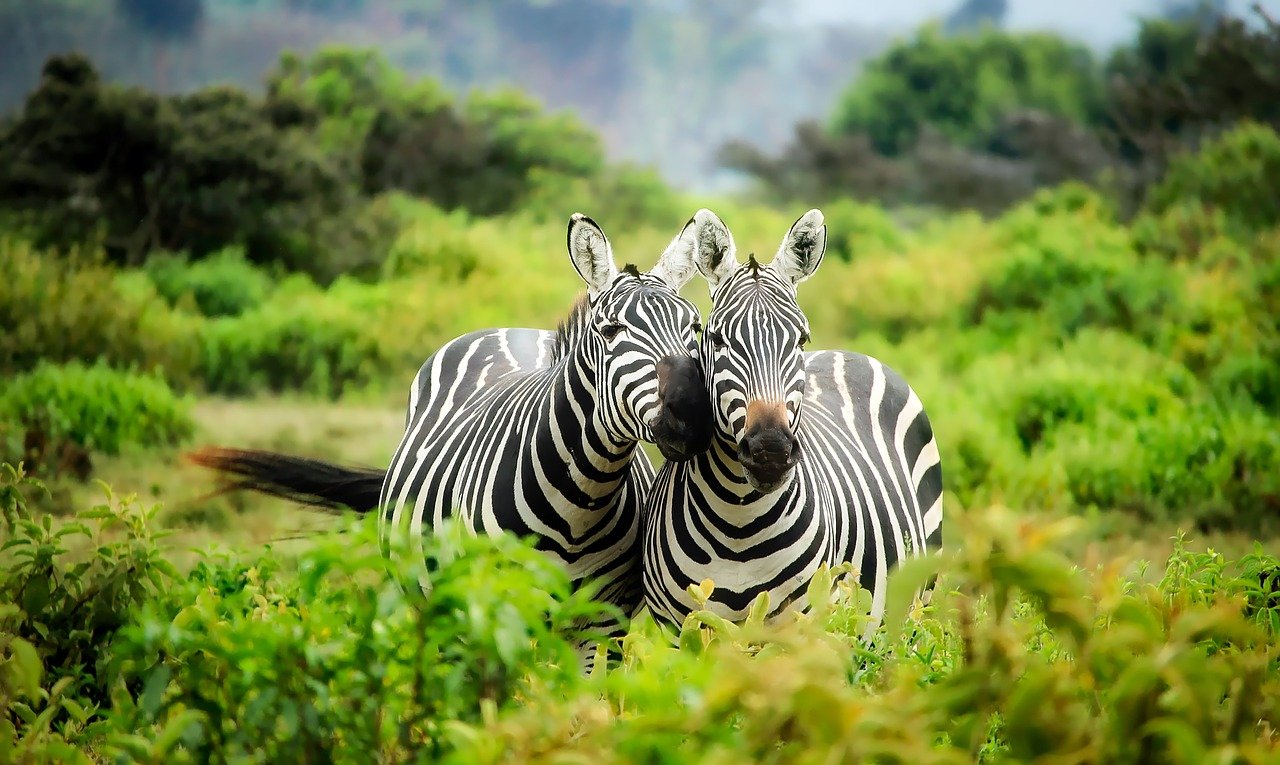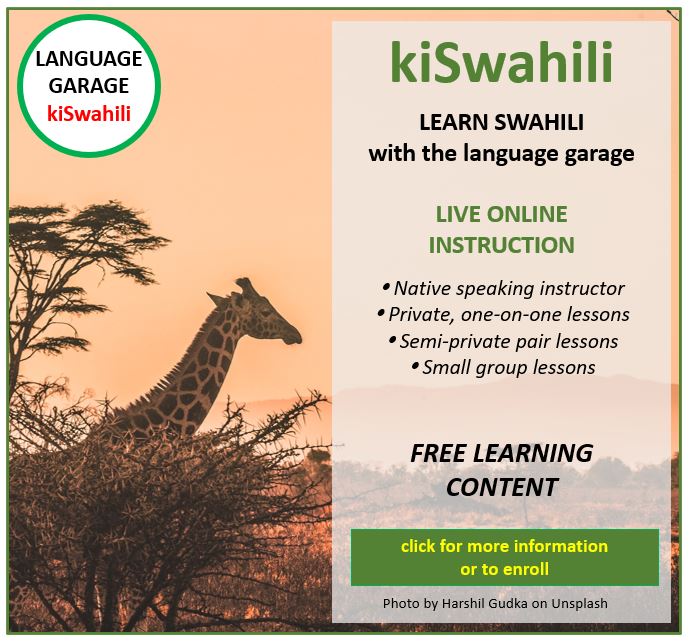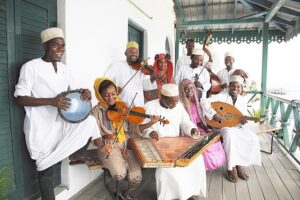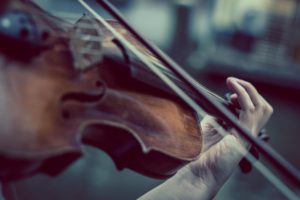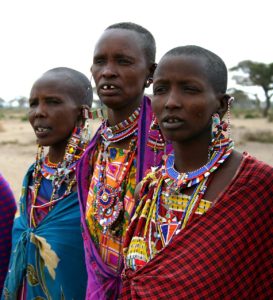Wanyama: Talking about Animals in Swahili
In this post you’ll learn how to talk about animals in Swahili. First, we’ll learn vocabulary and expressions for talking about pets. Next we’ll learn how to talk about the sounds that animals make. After that we’ll learn how to talk about farm animals in Swahili. Then we’ll look at birds, wild animals, animals you’d see at a zoo or on safari in Africa, and animals that live in the water. Finally, we’ll wrap up with Swahili vocabulary for bugs.
Una wanyama wowote uwapendao?Do you have any pets?
People keep all sorts of animals as pets, but the most common ones are mbwa a dog, paka a cat, samaki wa dhahabu a goldfish, paraketi a parakeet, kasuku a parrot, hamsta a hamster. One animal that you may not keep as a pet but that you can often find in or around buildings is: panya a mouse, or a rat.
- Tuna mbwa na paka.
We have a dog and a cat. - Jina la mbwa/paka wako ni?
What’s your dog’s/cat’s name?
- Nacheza na mtoto wa mbwa.
I’m playing with our puppy. - Namgusa kwa ulaini kipusi wetu.
I’m petting our kitten. - Je, mbwa wako huuma?
Does your dog bite? - Paka wako anakwara?
Does your cat scratch? - Nina samaki wa dhahabu katika bakuli la samaki.
I have a goldfish in a fishbowl. - Nina samaki wengi katika tangi la samaki.
I have a lot of fish in an aquarium. - Tuna hamsita mbili katika kizimba.
We have two hamsters in a cage. - Kasuku wangu anaongea sana.
My parrot talks a lot. - Nilipiga kelele nilipomwona panya.
I screamed when I saw a mouse.
Mbwa hutoa sauti gani? What sound does a dog make?
In English, dogs say “woof” and cats say “meow,” but of course that’s all different in Swahili.
- Mbwa hubweka. Mbwa husema ”woofu!”
Dogs bark. A dog says “Woof!” - Paka humiau. Paka husema “miau!“
Cats meow. A cat says “Meow!” - Ndege huimba. Ndege husema “twuiti!“
Birds chirp. A bird says “Tweet!” - Ng’ombe humoo. Ng’ombe husema “moo.”
Cows moo. A cow says “moo.” - Jogoo huwika. Jogoo husema “kokorododooo!”
Roosters crow. A rooster says “cock-a-doodle-do.” - Bata hufanya kwak. Bata husema ”kwak!”.
Ducks quack. A duck says “quack.” - Nguruwe hupiga kelele Nguruwe husema“Oinki oinki.”
Pigs squeal. A pig says “oink oink.” - Mbwa hunguruma anapokasirika.
Dogs growl when they’re angry. - Paka hukoroma wakiwa wamefurahi.
Cats purr when they’re happy.
Kwa shamba On the Farm
The most usual animals on a farm are: farasi a horse, ng’ombe a cow, fahali a bull, nguruwe a pig, kondoo a sheep, kuku a chicken, bata bukini a goose, mbuzi a goat, punda a donkey.
- Farasi anakimbia machungani.
The horse is running in the pasture. - Ng’ombe wako zizini.
The cows are in the barn. - Nguruwe wamelala kwa matope.
The pigs are lying in the mud. - Kuku zipo katika banda.
The chickens are in the coop. - Mkulima hukamua ng’ombe.
The farmer milks the cows. - Kuku hutaga mayai.
Chickens lay eggs. - Pamba hutoka kwa kondoo.
Wool comes from sheep.
Fur, Feathers, and Scales
Some other words related to animals that you want to know are: manyoya fur, gamba scales, mkia a tail, kwato a hoof, pembe a horn, manyoya a feather, kucha a claw.
- Bata bukini ana manyoya meupe.
The goose has white feathers. - Fahali wana pembe.
Bulls have horns. - Nguruwe ana mkia mdogo.
The pig has a little tail. - Ni wanyama gani wana kwato?
Which animals have hooves? - Kuwa mwangalifu! Paka ana makucha makali.
Be careful! The cat has sharp claws.
Ndege Birds
Here’s some vocabulary for our feathered friends: ndege a bird, bata a duck, tai an eagle, mwewe a hawk, njiwa a pigeon, bata mzinga a turkey, tausi a peacock, bata maji a swan, bundi an owl, shakwe a seagull. In Africa, you may also want to know how to say: mbuni an ostrich, heroe a flamingo.
- Unasikia ndege?
Do you hear the birds? - Kuna bata karibu na ziwa.
There are ducks next to the lake. - Tai huruka juu sana.
Eagles fly very high. - Tausi wana manyoya mazuri.
Peacocks have beautiful feathers. - Kuna njiwa wengi kwenye bustani.
There are a lot of pigeons in the park. - Bata maji ni wa kifahari sana.
Swans are very elegant. - Bundi anapiga kelele msituni.
An owl is hooting in the woods. - Shakwe wanaruka juu ya pwani.
The seagulls are flying over the beach.
Wanyama wa pori: Wild Animals
The most common wild animals around the world are these: kulungu a deer, dubu a bear, mbwa mwitu a wolf, mbweha a fox, rakuni a raccoon, chindi a squirrel, sungura a rabbit, popo a bat, nyoka a snake, mjusi a lizard.
- Kulungu wanakula nyasi shambani.
The deer are eating grass in the field. - Mbweha alikimbia msituni.
A fox ran into the woods. - Tuliona dubu tulipokuwa matembezini.
We saw a bear when we were hiking. - Mbwa mwitu hulia usiku.
Wolves howl at night. - Chindi hupanda miti haraka sana.
Squirrels climb trees very quickly. - Je, kuna rakuni hapa?
Are there raccoons here? - Popo hutoka baada ya jua kutua.
Bats come out after sunset. - Kuwa mwangalifu! Kuna nyoka kwenye njia.
Be careful! There’s a snake on the path.
Wanyama wa Afrika: African Animals
If you go to Kenya or Tanzania and go on safari or visit a park, you’ll see some of these animals. If you don’t go to Africa, you can probably see them in a zoo: tembo an elephant, simba a lion, chui a leopard, duma a cheetah, twiga a giraffe, punda milia a zebra, kifaru a rhinoceros, tumbili a monkey, sokwe a chimpanzee, gorila a gorilla, kiboko a hippopotamus, swala a gazelle, paa an antelope, ngiri a warthog, fisi a hyena, mhanga an aardvark, nyani a baboon, nyati/mbogo a buffalo, nyumbu a wildebeest, A chui-milia (tiger) isn’t African, but we’ll include it here in case you’re wondering how to say it!
- Tembo wana vigogo na mapusa marefu.
Elephants have trunks and long tusks. - Simba wananguruma na kulia kwa kutoa meno .
Lions are roaring and snarl. - Chui milia wana milia.
Tigers have stripes. - Twiga wana shingo ndefu sana.
Giraffes have very long necks. - Pundamilia wana milia mieusi na mieupe.
Zebras have black and white stripes. - Kifaru wana pembe kubwa sana.
Rhinos have very big horns. - Tumbili hukaa sana kwenye miti.
Monkeys spend a lot of time in trees. - Sokwe anafanana na binadamu/ watu.
Gorillas looks like a humans/people. - Kiboko hukimbia haraka!
Hippos run very fast!
Ndani ya maji In the Water
If you live near a lake or river, you may see some of these: samaki a fish, chura a frog, kasa a turtle, biva/fondosi a beaver, konokono a snail, mamba a crocodile/alligator.
- Ni aina gani ya samaki wanaoishi katika ziwa hili?
What kind of fish live in this lake? - Kuna kobe kwenye mwamba huo.
There’s a turtle on that rock. - Sisi husikia vyura usiku wakati wa kiangazi.
We hear frogs at night in the summer. - Konokono hutembea polepole sana.
Snails move very, very slowly. - Buku hutafuna miti na kutengeneza mabwawa.
Beavers chew trees and make dams. - Hiyo ni mamba?
Is that a crocodile?
Marine Animals in Swahili
In the ocean, you may see: papa a shark, nyangumi a whale, pomboo a dolphin, kaa a crab, kamba a lobster, yavuyavu a jellyfish, kiti cha pweza a starfish, mwanamizi a sea urchin, mkunga an eel, kundi a clam, kome a mussel, uduvi a shrimp, pweza an octopus, ngisi a squid.
- Ninaogopa papa, kwa hivyo siogelei baharini!
I’m afraid of sharks, so I don’t swim in the ocean! - Tuliona pomboo wakiogelea karibu na ufuo.
We saw dolphins swimming near the beach. - Hatuogelei leo. Kuna yavuyavu wengi sana.
We’re not swimming today. There are too many jellyfish. - Tulipata kiti cha pweza ufukoni.
We found a starfish on the beach. - Lo! Nilimkanyaga mwanamizi. Hiyo ni chungu!
Ouch! I stepped on a sea urchin. That’s painful! - Kuna kaa wengi karibu na miamba hiyo.
There are a lot of crabs near those rocks. - Chaza huishi kwenye mchanga.
Clams live in the sand. - Kome huishi kwenye miamba.
Mussels live on rocks.
Wadudu na Viumbe Wengine Wadogo: Insects and Other Small Creatures
If you every need to talk about insects, bugs, or other creep-crawlies, you will need to know these: kunguni a bug, buibui a spider, nyuki a bee, mende a coackroach/ a beetle, mdudu bibi-arusi a ladybug, nzi a fly, mbu a mosquito, kipepeo a butterfly, nondo a moth, mnyoo a worm, nge a scorpion, mchwa an ant.
- Sipendi mende!
I don’t like bugs/cockroaches! - Kuna buibui mkubwa anatambaa ukutani kwenye chumba changu cha kulala!
There’s a big spider crawling on the wall in my bedroom! - Mbu wananiuma usiku huu.
The mosquitos are biting me tonight. - Nimeumwa na nyuki.
I have been stung by a bee! - Vipepeo ni warembo na wana rangi nyingi.
Butterflies are beautiful and colorful. - Nondo huruka kuzunguka taa usiku.
Moths fly around lights at night. - Minyoo huishi kwenye udongo.
Worms live in the soil. - Wadudu bibi-arusi ni weusi na wekundu.
Ladybugs are black and red. - Kuwa mwangalifu! Kuna nge hapa.
Be careful! There are scorpions here.
Get on the road to speaking Swahili with the Language Garage!
We hope you’ve enjoyed learning how to talk about animals in Swahili. If you’d like to learn more:
- Create a free Language Garage account to access tons of Swahili vocabulary, grammar, and culture.
- Follow us on Facebook, LinkedIn, BlueSky, Twitter, Threads, Instagram, or Pinterest. We publish lots of Swahili vocabulary, grammar, and culture notes, so it’s a great way to pick up some new vocabulary and practice.
- Check out our other posts on Swahili language, culture, and more.
- Enroll in affordable, flexible, and personalized private online Swahili lessons or sign up for a small group online Swahili class.
Image Credit: Pixabay
